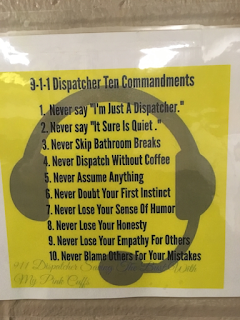We got a new radio system in our dispatch center, and the guy training us on it claimed we could use it at home, on a laptop.
This is a great idea in theory: It would save me gas, and clothes would be cheaper if all I had to buy was pajamas. Of course, video 911 is coming, and callers might not be comfortable with my Star Trek onesie.
Actually, callers might not like seeing me no matter what clothes I'm wearing.
.jpg) |
| "You got what stuck WHERE?" |
This is my thirtieth year celebrating Public Safety Telecommunications Week, which is in April between the snow storms, brush fires, and tornadoes. Since the title's so long, I started calling it PSTW, which is kind of ironic because PSTW sounds a lot like PTSD. Everyone who's dispatched longer than seven years gets to know both. It's science.
Here's the strange thing: I'm burned out on this job. Once too often I've picked up the 911 line only to hear hysterical screaming. Once too often I was the last person someone ever talked to. Once too often the name of a victim or suspect ended up being someone I knew.
Yet it's still the best full time job I ever had.
 |
| I actually do wear a cape, but only at home when no one is watching. But yay, cookie! Better keep it away from the dog. |
Maybe it's because we're actually doing something important. That's a weird thing to define when it comes to jobs, because the best paying ones often are the least important. When a family member is having a heart attack, you don't call your favorite sportsball player for an ambulance. For that matter, when your water pipe bursts you don't look up the number for Beyonce, or Reba McEntire. (Actually, Reba could probably help.)
But that's the way it goes, and at least I've never been stalked by a 911 groupie.
 |
| I know the artist! |
If you've considered being a dispatcher, I'd encourage it. It's way more important than being a security guard at the Oscars. Also, you have to be bad at it to lose your job--the demand for dispatchers just continues to go up.
Still, it can be just a bit stressful. When I'm talking to new people, I like to give them a few tips they don't get in formal training:
No matter what the caller says when you pick up the line, never reply with "You gotta be kidding me."
Always know if you have a live mic. Always.
Try to avoid cursing in dispatch--see above about live mics.
Well ... at least try not to curse too much.
If you have to scream in the bathroom, turn the water on first.
Yes, you are a first responder. When 911 rings, you're the first to respond to whatever the problem is. All the others have the advantage of knowing that problem, because you find out.
Hold your temper if your 911 caller starts with, "This isn't actually an emergency ..." Deal with it if the business line rings and it is an emergency. So it goes.
If you have to bang your head against a wall, choose a different place each time, to avoid damage to the concrete.
And finally: If the melatonin gives you nightmares, try sleepytime tea. Sleep is precious.
On a related note, that idea of dispatching on a laptop from home? No. I already have dreams in which I come downstairs and find the dispatch center has been moved to my living room, and I'm the only dispatcher. Besides, I like my Star Trek onesie, and Star Wars pajama bottoms just wouldn't be the same.
Buy some books, just in case of an emergency:
· Amazon: https://www.amazon.com/-/e/B0058CL6OO
· Barnes & Noble: https://www.barnesandnoble.com/s/"Mark R Hunter"
· Goodreads: https://www.goodreads.com/author/show/4898846.Mark_R_Hunter
· Blog: https://markrhunter.blogspot.com/
· Website: http://www.markrhunter.com/
· Instagram: https://www.instagram.com/ozma914/
· Facebook: https://www.facebook.com/MarkRHunter914
· Linkedin: https://www.linkedin.com/in/markrhunter/
· Twitter: https://twitter.com/MarkRHunter
· Youtube: https://www.youtube.com/@MarkRHunter
· Substack: https://substack.com/@markrhunter
· Tumblr: https://www.tumblr.com/ozma914
· Smashwords: https://www.smashwords.com/profile/view/ozma914
· Audible: https://www.audible.com/search?searchAuthor=Mark+R.+Hunter&ref_pageloadid=4C1TS2KZGoOjloaJ&pf
The odds of having to dial 911 are much lower when you're home reading.




































.png)




















